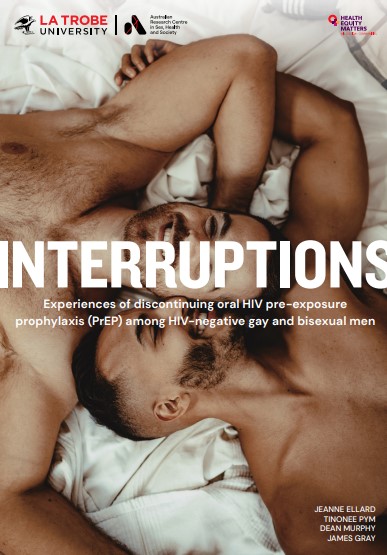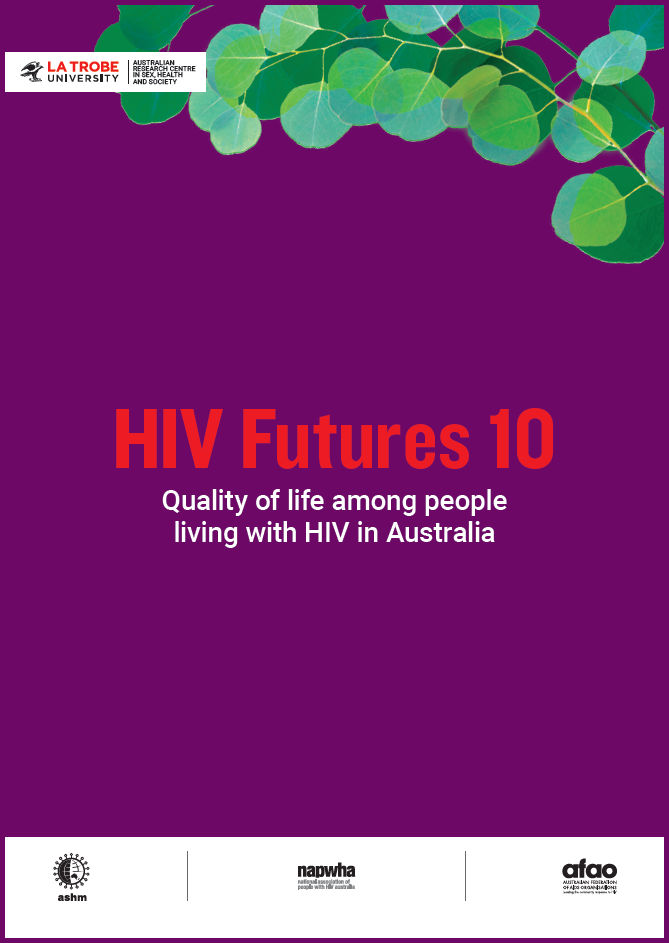Blood-borne viruses and other stigmatised conditions

Since our foundation, ARCSHS has conducted groundbreaking research that has shaped responses to HIV and other blood-borne viruses in Australia.
Formerly called ‘social responses to HIV and viral hepatitis’, this research theme has thus far focused on issues related to diagnosis, treatment, care, clinical practice, sexuality, risk, pleasure, wellbeing and quality of life in the context of HIV and viral hepatitis.
Research in this area has informed national strategies, policy, and clinical and community practice.
Our projects include:
- HIV Futures 10 - Quality of life among people living with HIV in Australia
- HIV Futures 11 - Now open for responses
- Previous iterations of HIV Futures
- Addressing hepatitis-C-related legal, policy and practice discrimination in a post-cure world
- Newly Positive
- Asia-Pacific MSM Internet Study - A six-country feasibility survey examining HIV prevention and care need and engagement among men who have sex with men
- W3 Framework - Understanding, demonstrating, and improving the impact of peer work in public health
- Trans and gender-diverse people living with HIV- a project to improve services and programs for trans and gender diverse people living with HIV
- Addressing the opportunities and risks of HIV elimination in Australia
- Blood-borne viruses and sexually transmissible infections - A stigma reduction toolkit for the Victorian healthcare workforce
- Mpox among people living with HIV
- Understanding experiences of telehealth care delivery for hepatitis C treatment in Australia
- VitalvoicesonhepC.org - Personal stories of hepatitis C, treatment and cure
- Pharmacy PrEP
- HIV and Hepatitis C: Networks in Flux
- The Interruptions Study - Experiences of discontinuing PrEP.
- The Stigma-Free Standard - A universal precautions approach to BBV's and STI-related stigma in healthcare
Newly Positive: Experiences of HIV seroconversion and diagnosis - 2025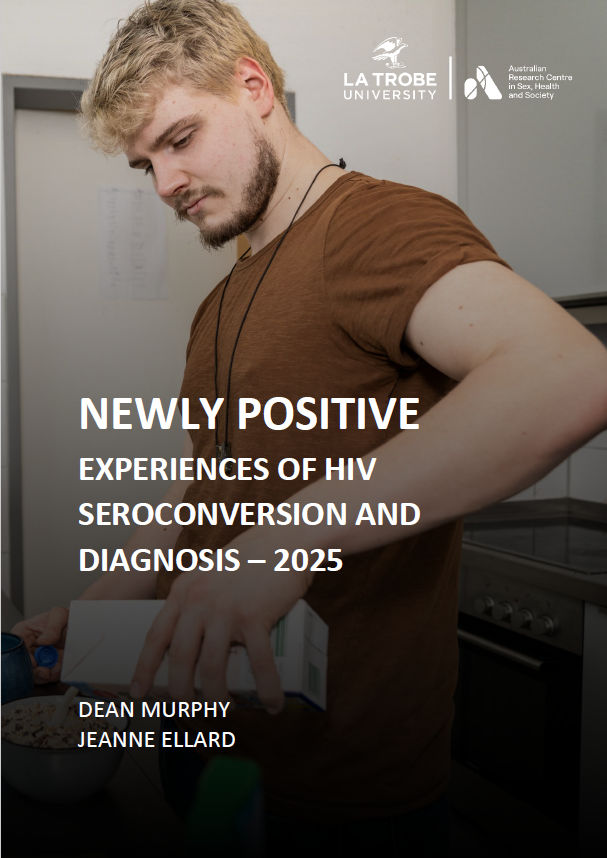
This report presents findings up to June 2025 from the Newly Positive study. The study is investigating experiences of seroconversion, diagnosis, and treatment uptake among people living in Australia who have been recently diagnosed with HIV. Data for the Newly Positive study are collected via semi-structured in-depth interviews.
Newly Positive: Case studies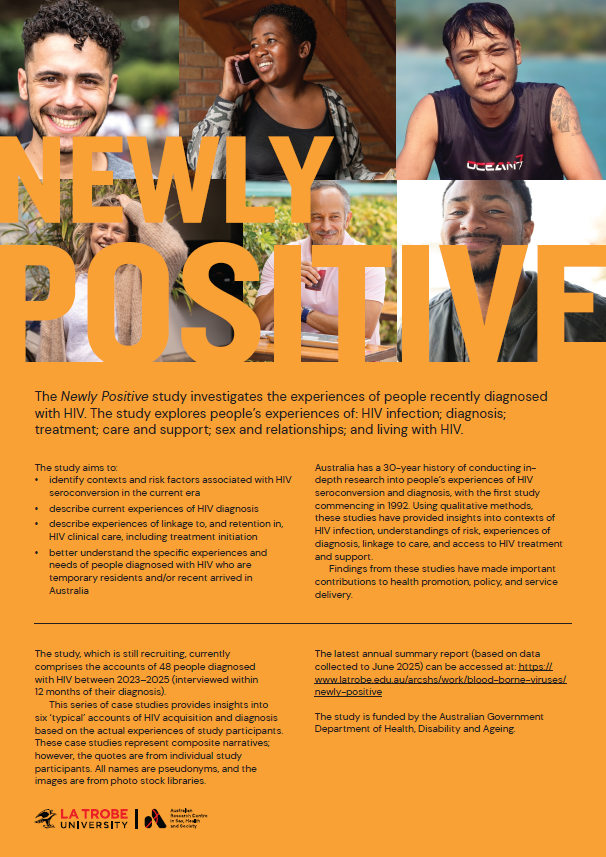
This series of composite case studies provides insights into six ‘typical’ accounts of HIV acquisition and diagnosis based on the actual experiences of participants in the Newly Positive study. These case studies represent composite narratives; however, the quotes are from individual study participants.
HIV FUTURES
HIV FUTURES is a research series about the health and wellbeing of people living with HIV (PLHIV) in Australia. Each study forms part of a series of cross-sectional surveys that have been run every two to three years since 1997. Funded by the Australian Government Department of Health, the aims of the study are to provide information about factors that support physical and emotional wellbeing among PLHIV.
Explore previous HIV FUTURES reports
Take the HIV FUTURES 11 survey
Reducing stigma and discrimination associated with blood-borne viruses and sexually transmissible infections: A stigma reduction toolkit for the Victorian healthcare workforce. 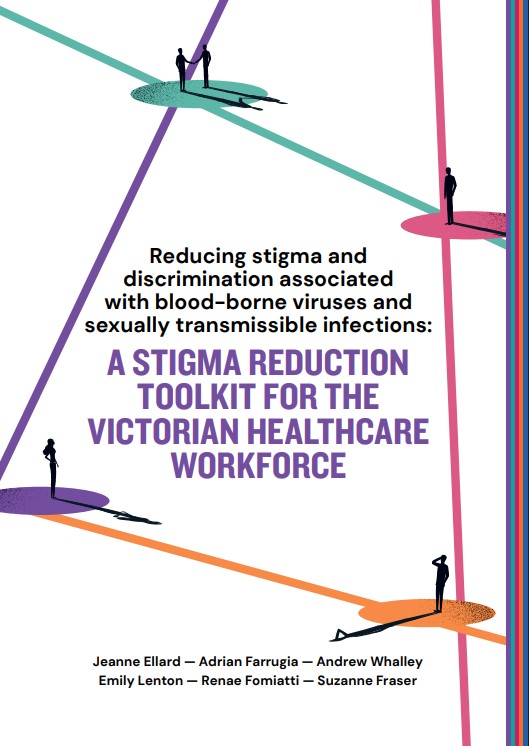
This toolkit was produced to provide Victorian healthcare services and professionals with a succinct and practical resource to support their efforts to reduce the stigma experienced by people living with and affected by blood-borne viruses (BBVs) and sexually transmissible infections (STIs) when accessing healthcare
Implementation guide for ‘Reducing stigma and discrimination associated with blood-borne viruses and sexually transmissible infections: A stigma reduction toolkit for the Victorian healthcare workforce' 
This implementation guide outlines a process for planning and then implementing initiatives drawn from the strategies and resources available in the BBV and STI Stigma Reduction toolkit.
HIV and hepatitis stigma reduction toolkit workshop
* Part 1: Background to the toolkit - Watch video
* Part 2: Panel discussion: Developing allyship Watch video
* Part 3: In practice / Legal & policy reform Watch video

